Case Information Sheet - ICTY
Case Information Sheet - ICTY
Case Information Sheet - ICTY
Create successful ePaper yourself
Turn your PDF publications into a flip-book with our unique Google optimized e-Paper software.
CASE INFORMATION SHEET<br />
“OPERATION STORM” (IT-06-90) GOTOVINA ET AL.<br />
In the period from 24 February until 22 April 2010, seven witnesses called by the Trial Chamber testified.<br />
On 2 and 3 June 2010, the Prosecution presented new evidence in its reopened case. Subsequently, on 10<br />
June 2010, the Defence of Ivan Čermak called two witnesses in its reopened case.<br />
The closing arguments were held from 30 August until 1 September 2010.<br />
RULE 98bis DECISION<br />
After the conclusion of the presentation of Prosecution evidence, the Trial Chamber can rule on whether<br />
there is a case to answer. If the Chamber believes that the Prosecution has not presented sufficient<br />
evidence to prove certain charges, it can dismiss those charges and enter a judgement of acquittal before<br />
the beginning of the presentation of Defence evidence.<br />
On 3 April 2009, the Trial Chamber issued an oral decision pursuant to Rule 98bis and dismissed the<br />
motions for acquittal filed by the Defence of Gotovina, Čermak and Markač.<br />
TRIAL CHAMBER JUDGEMENT<br />
On the basis of the evidence before it, and in accordance with an agreement between two of the Defence<br />
parties and the Prosecution, the Chamber found that an international armed conflict existed throughout<br />
the indictment period and area.<br />
The Chamber found that Croatian military forces and the Special Police committed acts of murder, cruel<br />
treatment, inhumane acts, destruction, plunder, persecution, and deportation as charged in the<br />
indictment. Considering the large number of crimes committed against the Serb population of the Krajina<br />
region in a relatively short period of time, the Chamber further found that there was a widespread and<br />
systematic attack directed against this Serb civilian population.<br />
The Prosecution charged all three accused as participants in a joint criminal enterprise, the objective of<br />
which was the permanent removal of the Serb population from the Krajina region. In assessing whether<br />
there was indeed a joint criminal enterprise, the Chamber carefully considered the discussions held at a<br />
meeting that took place on the island of Brijuni on 31 July 1995, a few days before the launching of<br />
Operation Storm. At this meeting Croatian president Franjo Tuđman met with high-ranking military<br />
officials to discuss the military operation. The Chamber found that the participants at this meeting also<br />
discussed the importance of the Krajina Serbs leaving as a result of the imminent attack. Responding to a<br />
statement by President Tuđman to this effect, Gotovina stated:”A large number of civilians are already<br />
evacuating Knin and heading towards Banja Luka and Belgrade. That means that if we continue this<br />
pressure, probably for some time to come, there won’t be so many civilians just those who have to stay,<br />
who have no possibility of leaving.”<br />
The Chamber carefully reviewed the statements of high-ranking Croatian officials at the Brijuni gathering,<br />
other meetings, and in public. The Chamber considered these statements in the context of its findings on<br />
the deportation, unlawful attacks on civilians and civilian objects, and the imposition of discriminatory<br />
measures, all of which were committed against Krajina Serbs. The Chamber found that certain members<br />
of the Croatian political and military leadership shared the common objective of the permanent removal<br />
of the Serb civilian population from the Krajina by force or threat of force, which amounted to and<br />
involved deportation, forcible transfer, and persecution through the imposition of restrictive and<br />
discriminatory measures, unlawful attacks against civilians and civilian objects, deportation, and forcible<br />
transfer. The joint criminal enterprise came into existence no later than the end of July 1995 and<br />
continued throughout the indictment period.<br />
The Chamber found that Tuđman, who was the main political and military leader in Croatia before,<br />
during, and after the indictment period, was a key member of the joint criminal enterprise. Tuđman<br />
intended to repopulate the Krajina with Croats and ensured that his ideas in this respect were<br />
5<br />
Document prepared by the Communications Service of the International Criminal Tribunal for the former Yugoslavia



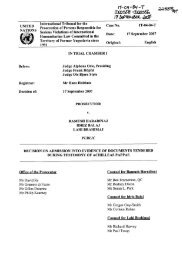
![utorak, 21.05.2002. 1 [Otvorena sjednica] 2 [Prvo stupanje ... - ICTY](https://img.yumpu.com/51523094/1/190x245/utorak-21052002-1-otvorena-sjednica-2-prvo-stupanje-icty.jpg?quality=85)
![sreda, 31.03.2010. 1 [Otvorena sednica] 2 [Optuženi su ušli u ... - ICTY](https://img.yumpu.com/51331326/1/190x245/sreda-31032010-1-otvorena-sednica-2-optua-3-4-eni-su-uali-u-icty.jpg?quality=85)
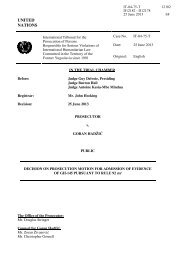
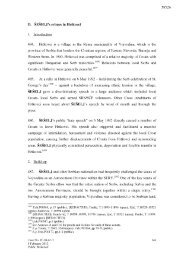
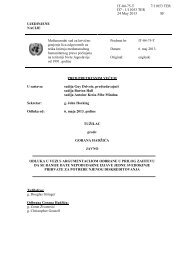
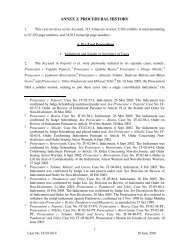
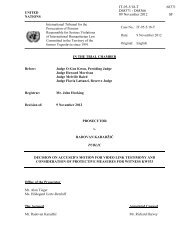
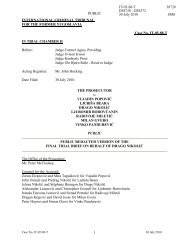
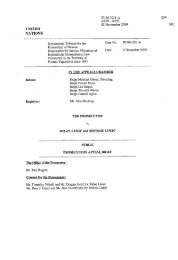
![petak, 03.11.2006. 1 [Otvorena sjednica] 2 [Optuženik je ušao ... - ICTY](https://img.yumpu.com/48534028/1/190x245/petak-03112006-1-otvorena-sjednica-2-optua-3-4-enik-je-uaao-icty.jpg?quality=85)
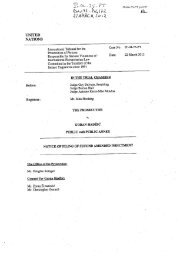
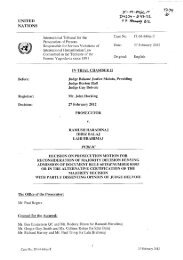
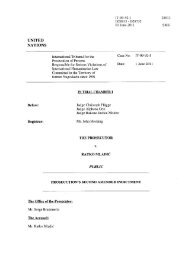
![petak, 11.07.2008. 1 [Otvorena sjednica] 2 [Optuženi su ušli u ... - ICTY](https://img.yumpu.com/47372453/1/190x245/petak-11072008-1-otvorena-sjednica-2-optua-3-4-eni-su-uali-u-icty.jpg?quality=85)